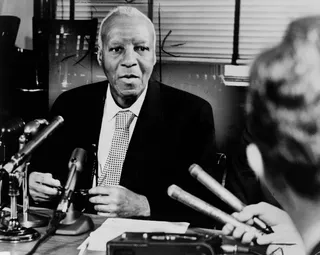Gentle Warriors: Non-Violence Advocates Who Changed the World
The mighty leaders paved the way with peace.

1 / 8
Violence Is Not the Answer - In his autobiography, Mahatma Gandhi wrote, “There are many causes that I am prepared to die for but no cause that I am prepared to kill for.” To commemorate the birthday of the leader of the Indian independence movement, the United Nations declared Oct. 2 the International Day of Non-Violence. Keep reading to learn about additional pioneers of the philosophy and strategy of non-violence. —Patrice Peck(Photos from left: Central Press/Getty Images, Paula Bronstein /Getty Images, Tehrkot /Landov)

2 / 8
Mahatma Gandhi - Established in June 2007, the International Day of Non-Violence is observed to “disseminate the message of non-violence, including through education and public awareness,” according to its resolution. As Mahatma Gandhi, the motivation for this day, once said, “Non-violence is the greatest force at the disposal of mankind. It is mightier than the mightiest weapon of destruction devised by the ingenuity of man.”(Photo: Central Press/Getty Images)

3 / 8
Cesar Chavez - Mexican-American labor leader, civil rights activist and farm worker advocate Cesar Chavez dedicated his life to improving the treatment of workers and union laborers. Along with Dolores Huerta, the historical icon founded the National Farm Workers Association in 1962, which adopted aggressive yet non-violent tactics that garnered unprecedented nationwide support for the farm laborer’s struggles.(Photo: Tim Graham/Evening Standard/Getty Images)

4 / 8
Martin Luther King Jr. and Ralph Abernathy - As major leaders of the American civil rights movement, Martin Luther King, Jr. and Ralph Abernathy led successful non-violent movements in Montgomery, Birmingham, Mississippi, Albany, Washington, Memphis, Chicago, Selma and additional cities. Until King’s assassination, the best friends worked together for 13 years, helping to land the passage of the Civil Rights Act of 1964, the Voting Rights Act of 1965 and the abolition of Jim Crow in the South.(Photo: Reg Lancaster/Express/Getty Images)

5 / 8
Congressman John Lewis - U.S. Congressman John Lewis was a staunch advocate of the discipline and philosophy of non-violence since attending workshops as a student during the civil rights movement. Through his organizing experience, Lewis would eventually become one of the Big Six leaders in the movement, along with fellow high-profile non-violence adherents Martin Luther King Jr. and A. Philip Randolph.(Photo: Paul Morigi/Getty Images for Ovation)
ADVERTISEMENT

6 / 8
Ken Saro-Wiwa - A man of many talents, Nigerian writer and activist Ken Saro-Wiwa used poetry, prose and other non-violent resistance techniques to protest the pollution of the Niger Delta and other environmental damage done to his homeland by rich corporations and government authorities. He received the Right Livelihood Award — considered the alternative Nobel Peace Prize — in 1994.(Photo: Wikicommons)

7 / 8
A. Philip Randolph - Called the most dangerous man in America by President Woodrow Wilson, labor leader and social activist A. Philip Randolph was a firm believer in non-violence who committed his life to fighting for full human rights. He helped spearhead several key events in the American civil rights movement including the March on Washington and he led the first mostly Black labor union, Brotherhood of Sleeping Car Porters.(Photo: APIC/Getty Images)
Photo By APIC/Getty Images
